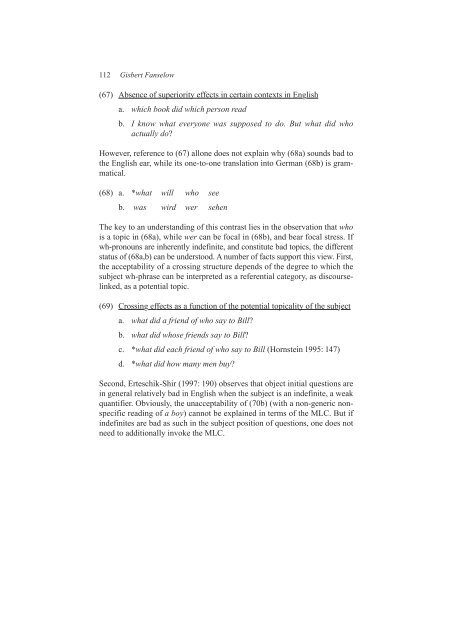Minimality Effects in Syntax · The MLC and Derivational Economy ...
Minimality Effects in Syntax · The MLC and Derivational Economy ...
Minimality Effects in Syntax · The MLC and Derivational Economy ...
You also want an ePaper? Increase the reach of your titles
YUMPU automatically turns print PDFs into web optimized ePapers that Google loves.
112 Gisbert Fanselow<br />
(67) Absence of superiority effects <strong>in</strong> certa<strong>in</strong> contexts <strong>in</strong> English<br />
a. which book did which person read<br />
b. I know what everyone was supposed to do. But what did who<br />
actually do?<br />
However, reference to (67) allone does not expla<strong>in</strong> why (68a) sounds bad to<br />
the English ear, while its one-to-one translation <strong>in</strong>to German (68b) is grammatical.<br />
(68) a.*what will who see<br />
b. was wird wer sehen<br />
<strong>The</strong> key to an underst<strong>and</strong><strong>in</strong>g of this contrast lies <strong>in</strong> the observation that who<br />
is a topic <strong>in</strong> (68a), while wer can be focal <strong>in</strong> (68b), <strong>and</strong> bear focal stress. If<br />
wh-pronouns are <strong>in</strong>herently <strong>in</strong>def<strong>in</strong>ite, <strong>and</strong> constitute bad topics, the different<br />
status of (68a,b) can be understood. A number of facts support this view. First,<br />
the acceptability of a cross<strong>in</strong>g structure depends of the degree to which the<br />
subject wh-phrase can be <strong>in</strong>terpreted as a referential category, as discoursel<strong>in</strong>ked,<br />
as a potential topic.<br />
(69) Cross<strong>in</strong>g effects as a function of the potential topicality of the subject<br />
a. what did a friend of who say to Bill?<br />
b. what did whose friends say to Bill?<br />
c.*what did each friend of who say to Bill (Hornste<strong>in</strong> 1995: 147)<br />
d.*what did how many men buy?<br />
Second, Erteschik-Shir (1997: 190) observes that object <strong>in</strong>itial questions are<br />
<strong>in</strong> general relatively bad <strong>in</strong> English when the subject is an <strong>in</strong>def<strong>in</strong>ite, a weak<br />
quantifier. Obviously, the unacceptability of (70b) (with a non-generic nonspecific<br />
read<strong>in</strong>g of a boy) cannot be expla<strong>in</strong>ed <strong>in</strong> terms of the <strong>MLC</strong>. But if<br />
<strong>in</strong>def<strong>in</strong>ites are bad as such <strong>in</strong> the subject position of questions, one does not<br />
need to additionally <strong>in</strong>voke the <strong>MLC</strong>.
















